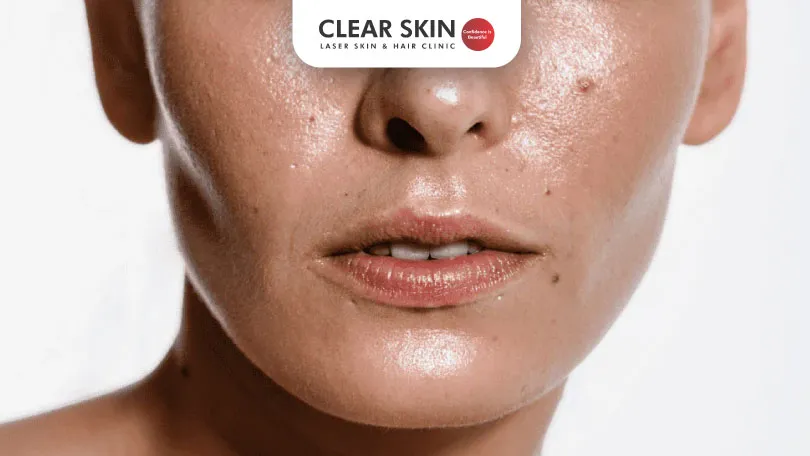Can you Control Oily Skin?
Reviewed By: ![]() Dr. Dhanraj Chavan
Dr. Dhanraj Chavan
Updated on: 13th November, 2024

Understanding the science behind oily skin can empower you to manage it better.
If you’ve struggled with oily skin, you’re not alone. It’s a common concern influenced by factors such as genetics, diet, hormones, and lifestyle. Let’s explore these factors and discover how you can take control of your skin health.
Table Of Content
- The Role of Diet: High Glycemic Index Foods
- Hormonal Impacts on Skin
- Oil Gland Activity
- The Importance of a Skincare Routine
- The Importance of Hydration
- Advanced Treatments: Medications and Procedures
- Conclusion
The Role of Diet: High Glycemic Index Foods
Diet plays a crucial role in skin health, especially when it comes to oily skin. Foods with a high glycemic index (GI) can spike blood sugar levels, leading to increased oil production by the sebaceous glands. These glands secrete sebum, which moisturizes and protects your skin. However, excessive sebum can lead to oily skin and acne.
To manage this, consider moderating your intake of high-GI foods such as white bread, sugary snacks, and fried foods. Opt for low-GI alternatives like whole grains, fruits, and vegetables to help stabilize your blood sugar levels and potentially reduce oiliness.
Hormonal Impacts on Skin
Hormones play a significant role in oil production. During puberty, menstruation, pregnancy, or times of stress, hormone levels can fluctuate, leading to increased sebum production. Understanding your hormonal cycle and its impact on your skin can help you manage these changes more effectively.
Oil Gland Activity
The activity of your oil glands is largely determined by genetics. However, lifestyle changes can help manage the symptoms. If you notice that certain foods or stress levels increase your skin’s oiliness, try to identify and mitigate these triggers.
For those whose lifestyle adjustments don’t suffice, topical treatments can be very helpful. Ingredients such as retinoids, alpha hydroxy acids (AHAs) like glycolic acid, and salicylic acid are effective in regulating oil production. These substances work by exfoliating the skin, unclogging pores, and reducing the activity of sebaceous glands.
The Importance of a Skincare Routine
Establishing a consistent skincare routine is essential for managing oily skin. Use gentle, foaming cleansers to remove excess oil without stripping your skin of its natural moisture. Incorporate lightweight, non-comedogenic moisturizers that hydrate without clogging pores. Regular exfoliation with AHAs or BHAs can keep your pores clear and reduce shine.
The Importance of Hydration
Hydration is a key element often overlooked in oily skin management. Keeping your skin well-hydrated helps balance oil production. Drink plenty of water and use hydrating products that contain ingredients like hyaluronic acid to maintain skin moisture levels.
Advanced Treatments: Medications and Procedures
In cases where topical treatments aren’t enough, medications such as isotretinoin may be prescribed by a dermatologist. Isotretinoin is a powerful drug that significantly reduces oil gland activity, providing a long-term solution for managing oily skin and preventing acne breakouts.
For those seeking additional interventions, dermatological procedures like chemical peels and laser therapy can target oil glands directly, helping to shrink them and decrease overall oil production. These treatments should always be performed by a qualified dermatologist to ensure safety and effectiveness.
Consulting a Dermatologist
Consulting a dermatologist is invaluable for personalized advice. If you’re in Pune, seeking the expertise of a dermatologist in Pune can provide local insights into your specific skin type, recommend tailored treatments, and help you navigate the myriad of skincare products available. A dermatologist can also address any underlying conditions contributing to your skin concerns, ensuring a comprehensive approach to treatment.
Do You Know?
Roughly 250 Patients Are Treated
Everyday By These Dermatologists
(You are one click away from flawless skin)
Consult Our Dermatologist?
Conclusion
While genetics play a significant role in the nature of your skin, managing lifestyle factors and utilizing the right treatments can bring oily skin under control. Whether through dietary changes, topical applications, or advanced medical treatments, there are numerous strategies available to help you achieve balanced, healthy skin.
Always consult with a Clear Skin Clinic to tailor a treatment plan suited to your specific needs. Remember, understanding your skin is the first step towards effective management and achieving the clear, radiant complexion you desire.
Further Reading
Coffee and Acne: Uncovering the Truth Behind the Breakouts
Find out if coffee causes acne & how it affects your skin. Talk to the experts at Clear Skin Clinic in Pune for personalized acne treatment.
Conquering Stress Acne: Effective Strategies for Clearer Skin
The symptoms of stress acne, effective treatment options, and expert prevention tips from Clear Skin Clinic in Pune.
How to Get Rid of Pimples: Effective Hacks & Tips
Discover effective hacks and expert tips from Dr. Dhanraj Chavan to get rid of big pimples and achieve clear, glowing skin.
Blind Pimple Causes: 6 Key Reasons Explained
Discover the top 6 causes of blind pimples and how to treat them.
Have thoughts? Please let us know
We are committed not only to treating you, but also educating you.






